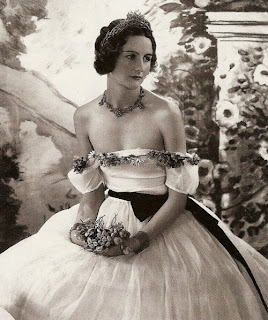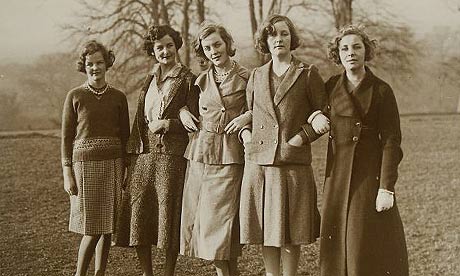![]() |
| Nancy Mitford, 1929, by Cecil Beaton |
I have just finished reading—and loving—Nancy Mitford's
Love in a Cold Climate, which Mitford biographer and man of letters Harold Acton called her best novel. A satire on Britain's upper crust in the early part of the last century, it's whopping good fun: a burlesque with an adamantine vein of truth running through it. As
The Guardian writes:
Mitford's witty, glittering stories are much more than giddy society gossip. The Pursuit of Love was Mitford's first real success, and was largely autobiographical, but it is Love in a Cold Climate, first published in 1949, for which she is best remembered. The novel, narrated by the Hon Frances Logan, is the story of the Montdore family and the coming-out of their daughter Polly, following her through her debutante ball and the subsequent Season in pursuit of a husband. It is a comic novel, whose splendidly acerbic dialogue masks what Hensher calls 'a suffering which is nowhere quite stated, and everywhere felt'. But it is also an elegy for a way of English life that had all but gone.
![]()
Here is a passage I particularly admire for its cadences and brio. Polly, the only daughter of the exceedingly rich Lady Montdore, had shocked one and all by marrying the much older "Boy" Dougdale, who happened to be the husband of Polly's recently deceased aunt—as well as the sometime lover of her mother. Yet Lady M is eventually able to surmount her misery with the assistance of the exceedingly gay Cedric, a distant relative and heir to her estate who swoops in from Paris to transform her and her environs into a glamorous spectacle. Her neighbors in the country are not amused.
I soon found out that the most annoying feature of the whole thing to them was the radiant happiness of Lady Montdore. They had all been delighted by Polly's marriage, even those people who might have been expected wholeheartedly to take Lady Montdore's side over it, such as the parents of pretty young daughters, having said with smug satisfaction “Serve her right." They hated her and were glad to see her downed. Now, it seemed, the few remaining days of this wicked woman, who never invited them to her parties, were being suitably darkened with a sorrow which must soon bring her grey hairs to the grave. The curtain rises for the last act and the stalls are filled with Boreleys all agog to witness the agony, the dissolution, the muffled drum, the catafalque, the procession to the vault, the lowering to the tomb, the darkness. But what is this? Onto the stage in a dazzling glare, springs Lady Montdore, supple as a young cat and her grey hair now a curious shade of blue, with a partner, a terrible creature from Sodom, from Gomorrah, from Paris, and with him proceeds to dance a wild fandango of delight. No wonder they were cross.
![]()
You'll find more Mitford excerpts
here. The title of
Love in a Cold Climate, which was first published in 1946, comes from George Orwell's 1936 novel
Keep The Aspidistra Flying. We're carrying it as part of our extensive collection of
books and films related to the Downton Abbey era. I also recommend the autobiography
Hons and Rebels by Nancy's sister Jessica, the fifth of the six inimitable Mitford sisters. In this case, truth
is stranger than fiction!



